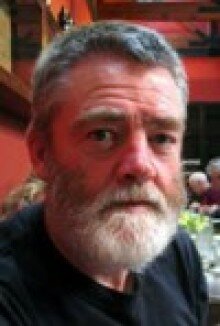
Gerry Murphy was born in Cork in 1952. After dropping out of university in the early 1970s he spent some years working in London and living in an Israeli Kibbutz before returning to Cork where he has remained ever since. A champion swimmer he has made his living primarily as a life guard and swimming pool manager. He began publishing his books in the mid-80s containing poems so far removed from the Irish tradition that many doubted they were poems at all. Undaunted and with his usual irreverence, Murphy once insisted on using a singularly detracting review alongside the more praising ones as a blurb for one of his books. Amusingly this had the effect of silencing and defusing many of his critics.
Murphy appears to have much in common with the American poet Charles Simic, both employ the full modernist armoury of Surrealist, Dadaist and Expressionist techniques, both appear to have been influenced more by South American and Eastern European poets than by poets of their own language. More importantly, both appreciate that edifying, profound ideas can be conveyed through humour and irreverence as appropriately and as effectively as through serious, weighty statement.
Murphy has also been influenced by the structures and techniques of Jazz music, not in the same way as Californian poets such as Ferlinghetti who appeared to aim to reproduce in words the sound of Jazz music, rather Murphy has employed the mimetic and pastiche elements of Jazz. He has produced many ‘after’ poems, which range from fully-fledged line-by-line variations to completely original poems with occasional riffs and suggestions of others. The “after August Kleinzahler” poem reproduced here contains just two words of Kleinzahler but no. And I’m sure no one will suggest that Freud wrote about slamming a door on an old lady’s back.
Although running counterpoint to literary tradition, Murphy’s work is highly, self-consciously literary and much of the most recent work displays intense absorption of the Roman classics either through direct reference or employment of the pithy epigram. In spite of his interest in classical poets (or might that be because of?) Murphy’s vision is very much preoccupied with the political and historical pressures of the last century; politics and war impinge on everything in Murphy’s world, even love. And indeed it would be perverse to conclude this article without saying that Murphy is a great and prolific love poet whose paeans to the muse (or more accurately various muses, notoriously one particular poem has been rededicated to many individuals) display all of the aforementioned techniques and characteristics.
Selected Bibliography
Poetry
A Small Fat Boy Walking Backwards, Commons Press, Cork, 1985
Rio de la Plata and All That Dedalus Press, Dublin, 1993
The Empty Quarter, Dedalus Press, Dublin, 1995
Extracts from the Lost Log-Book of Christopher Columbus Dedalus Press, Dublin, 1999
Torso of an Ex-Girlfriend Dedalus Press, Dublin, 2002
End of Part One – New & Selected Poems Dedalus Press, Dublin, 2006
Translation
Pocket Apocalypse, poems by Katarzyna Borun-Jagodzinska, Southword Editions, Cork, 2005
Links
http://www.dedaluspress.com/poets/murphy.html
poets page on publisher’s website with an MP3 recording of five short poems
http://www.munsterlit.ie/Conwriters/gerry_murphy.htm
/>bio note with links to a review

